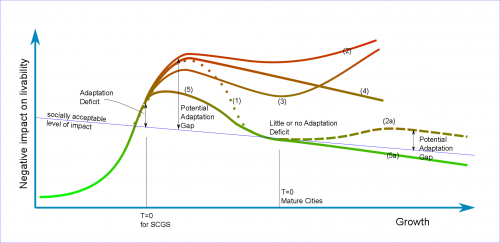Urban adaptation in rapidly growing cities need a paradigm shift
We have been working with rapid developing cities like Can Tho, vietnam (see our work) regarding adaptation. Here we intentionally use the term "Urban Adaptation" instead of more common "Climate Adaptation". The reason for that is, in cities like Can Tho (or any other Secondary City in the Global South - SCGS), climate change[1] -- while being extremely relevant and important -- is only one of many pressures that they have to deal with in adaptation; Land-cover change, rapid population increase, increasing pollution are some others.
In these two part series, we argue the importance of changing the way we look at urban adaptation in SCGS. Simply put, we are in a context that is a combination of high urgency and high uncertainty. But, we still use 'predictive' planning approaches that works well only in contexts of good predictability and less uncertainty. While there are multiple reasons (historical, cultural, economic) for this, it is important to start the discussion on how to change that to a more 'adaptive' -- or as we call it 'agile' approach. That is the story of these two articles.
For the people in a hurry
Part I
Part II
Part I
- Citation
- Pathirana A, Radhakrishnan M, Quan NH, Zevenbergen C. Managing urban water systems with significant adaptation deficits—unified framework for secondary cities: part I—conceptual framework. Climatic Change. 2017:1-4.
- Original article
- https://link.springer.com/article/10.1007/s10584-017-1953-9
- Download author's copy
- File:Scgs adaptation cc paper part I.pdf
Part II
- Citation
- Pathirana A, Radhakrishnan M, Ashley, R, Quan NH, Zevenbergen C. Managing urban water systems with significant adaptation deficits—unified framework for secondary cities: part II—the practice. Climatic Change. 2017:1-18.
- Original article
- https://link.springer.com/article/10.1007/s10584-017-2059-0
- Download author's copy
- File:Scgs adaptation cc paper part II.pdf
- ↑ While it should not be necessary to state the obvious, one can not be too careful when talking about climate change these days! In spite of extremely strong evidence and scientific consensus, some people still try to deny climate change. We are strongly convince that anthropogenic climate change is real and is a significant threat to human security. Climate change mitigation should be one of the primary collective responsibilities of the humanity. As a professional, my domain of work is in climate adaptation -- I am not an expert on climate change mitigation -- that's simply why I don't talk much about climate mitigation.
